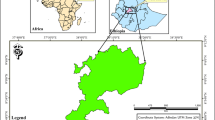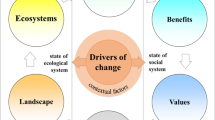Abstract
Land use change significantly affects ecosystem services provision. This impact, however, is difficult to assess and thus often neglected in policy making. It is therefore the task of territorial planning discipline to explore methodological approaches capable of making explicit complex relationships in order to use them as tools for effectively designing the sustainable development.
In this paper, we report changes in land use over a 28-year period considering the territory of the Basilicata region. Our aim is to translate these changes in ecosystem services values, highlighting potentials of a framework able to integrate monetary figures into a larger approach based on the interactions between biomes and the meaning of human well-being more closely linked to the economics sector.
The results show that the greatest loss occurred at the detriment of wooded areas and agricultural mosaic while bare land and arable land increased. Several municipalities experienced significant changes involving above all the classes in the agricultural compartment. The growth of urban settlements took place everywhere affecting to a much greater extent the most important centers, the only ones not subject to depopulation.
Our estimate quantifies these changes in a total annual loss of ecosystem service delivery higher than €39 million with some municipalities where this loss corresponds to a significant part of GDP. Reversing the perspective, moreover, the internal areas emerge where, also due to depopulation, the monetization of ecosystem services leads to pro capita amounts equivalent to multiples of GDP per capita.
The study sets the basis for an approach oriented towards defining tangible criteria for assessing the sustainability of territorial transformations and land use change.
Access this chapter
Tax calculation will be finalised at checkout
Purchases are for personal use only
Similar content being viewed by others
References
Costanza, R., et al.: The value of the world’s ecosystem services and natural capital. Nature 387, 253–260 (1997). https://doi.org/10.1038/387253a0
Alcamo, J., Bennett, E.M.: Millennium Ecosystem Assessment (Program): Ecosystems and human well-being : a framework for assessment. Island Press (2003)
Ten Brink, P.: The economics of ecosystems and biodiversity in national and international policy making. (2012). https://doi.org/10.4324/9781849775496
Corbera, E.: Problematizing REDD + as an experiment in payments for ecosystem services. Curr. Opin. Env. Sust. 4(6), 612–619 (2012). https://doi.org/10.1016/j.cosust.2012.09.010
Maes, J., et al.: Mapping ecosystem services for policy support and decision making in the european union. Ecosyst. Serv. 1, 31–39 (2012). https://doi.org/10.1016/j.ecoser.2012.06.004
Burkhard, B., Kroll, F., Nedkov, S., Müller, F.: Mapping ecosystem service supply, demand and budgets. Ecol. Indic. 21, 17–29 (2012). https://doi.org/10.1016/j.ecolind.2011.06.019
Schröter, M., Stumpf, K.H., Loos, J., van Oudenhoven, A.P.E., Böhnke-Henrichs, A., Abson, D.J.: Refocusing ecosystem services towards sustainability. Ecosyst. Serv. 25, 35–43 (2017). https://doi.org/10.1016/j.ecoser.2017.03.019
Fisher, B., et al.: Ecosystem services and economic theory: integration for policy-relevant research. Ecol. Appl. 18, 2050–2067 (2008). https://doi.org/10.1890/07-1537.1
Rodríguez-Loinaz, G., Alday, J.G., Onaindia, M.: Multiple ecosystem services landscape index: A tool for multifunctional landscapes conservation. J. Environ. Manage. 147, 152–163 (2015). https://doi.org/10.1016/j.jenvman.2014.09.001
Gutman, P.: Ecosystem services: foundations for a new rural-urban compact. Ecol. Econ. 62(3-4), 383–387 (2007). https://doi.org/10.1016/j.ecolecon.2007.02.027
Gómez-Baggethun, E., de Groot, R., Lomas, P.L., Montes, C.: The history of ecosystem services in economic theory and practice: from early notions to markets and payment schemes. Ecol. Econ. 69, 1209–1218 (2010). https://doi.org/10.1016/j.ecolecon.2009.11.007
Pistorius, T., et al.: Lessons for REDDplus: a comparative analysis of the german discourse on forest functions and the global ecosystem services debate. For. Policy Econ. 18, 4–12 (2012). https://doi.org/10.1016/j.forpol.2011.09.001
Roseland, M.: Sustainable community development: integrating environmental, economic, and social objectives. Prog. Plann. 54, 73–132 (2000). https://doi.org/10.1016/S0305-9006(00)00003-9
Costanza, R., et al.: Changes in the global value of ecosystem services. Glob. Environ. Chang. 26, 152–158 (2014)
Eurostat: GDP per capita in EU regions., Bruxelles (2020)
Istat.it Popolazione e famiglie, https://www.istat.it/it/popolazione-e-famiglie, Accessed 06 Dec 2019
Nolè, G., Lasaponara, R., Lanorte, A., Murgante, B.: Quantifying urban sprawl with spatial autocorrelation techniques using multi-temporal satellite data. Int. J. Agric. Environ. Inf. Syst. 5, 20–38 (2014). https://doi.org/10.4018/IJAEIS.2014040102
Murgante, B., Borruso, G., Lapucci, A.: Sustainable development: concepts and methods for its application in urban and environmental planning. Stud. Comput. Intell. 348, 1–15 (2011). https://doi.org/10.1007/978-3-642-19733-8_1
Murgante, B., Borruso, G., Balletto, G., Castiglia, P., Dettori, M.: Why italy first? health, geographical and planning aspects of the covid-19 outbreak. Sustainability. 12, 5064 (2020). https://doi.org/10.3390/su12125064
Lasaponara, R., et al.: Spatial open data for monitoring risks and preserving archaeological areas and landscape: case studies at kom el shoqafa, egypt and shush. Iran. Sustainability. 9, 572 (2017). https://doi.org/10.3390/su9040572
Las Casas, G., Murgante, B., Scorza, F.: Regional local development strategies benefiting from open data and open tools and an outlook on the renewable energy sources contribution. In: Papa, R., Fistola, R. (eds.) Smart Energy in the Smart City. GET, pp. 275–290. Springer, Cham (2016). https://doi.org/10.1007/978-3-319-31157-9_14
Jiang, W.: Mapping ecosystem service value in Germany. Int. J. Sustain. Dev. World Ecol. 25, 518–534 (2018). https://doi.org/10.1080/13504509.2018.1430623
Elfadaly, A., Attia, W., Qelichi, M.M., Murgante, B., Lasaponara, R.: Management of cultural heritage sites using remote sensing indices and spatial analysis techniques. Surv. Geophys. 39(6), 1347–1377 (2018). https://doi.org/10.1007/s10712-018-9489-8
Saganeiti, L., Pilogallo, A., Faruolo, G., Scorza, F., Murgante, B.: Territorial fragmentation and renewable energy source plants: Which relationship? Sustain. 12, 1828 (2020). https://doi.org/10.3390/SU12051828
Scorza, F., Saganeiti, L., Pilogallo, A., Murgante, B.: Ghost Planning: the inefficiency of energy sector policies in a low population density region. Arch. DI Stud. URBANI E Reg. (2020, in Press)
Saganeiti, L., Pilogallo, A., Faruolo, G., Scorza, F., Murgante, B.: Energy landscape fragmentation: basilicata region (italy) study case. In: Misra, S., et al. (eds.) ICCSA 2019. LNCS, vol. 11621, pp. 692–700. Springer, Cham (2019). https://doi.org/10.1007/978-3-030-24302-9_50
Scorza, F., Pilogallo, A., Saganeiti, L., Murgante, B.: Natura 2000 areas and sites of national interest (sni): measuring (un)integration between naturalness preservation and environmental remediation policies. Sustainability. 12, 2928 (2020). https://doi.org/10.3390/su12072928
Pilogallo, A., Saganeiti, L., Scorza, F., Murgante, B.: Ecosystem services approach to evaluate renewable energy plants effects. In: Misra, S., et al. (eds.) ICCSA 2019. LNCS, vol. 11624, pp. 281–290. Springer, Cham (2019). https://doi.org/10.1007/978-3-030-24311-1_20
Scorza, F., Pilogallo, A., Saganeiti, L., Murgante, B., Pontrandolfi, P.: Comparing the territorial performances of renewable energy sources’ plants with an integrated ecosystem services loss assessment: a case study from the basilicata region (Italy). Sustain. Cities Soc. 56, 102082 (2020). https://doi.org/10.1016/J.SCS.2020.102082
Casas, G.L., Scorza, F.: Sustainable planning: a methodological toolkit. In: Gervasi, O., et al. (eds.) ICCSA 2016. LNCS, vol. 9786, pp. 627–635. Springer, Cham (2016). https://doi.org/10.1007/978-3-319-42085-1_53
Dvarioniene, J., Grecu, V., Lai, S., Scorza, F.: Four perspectives of applied sustainability: research implications and possible integrations. In: Gervasi, O., et al. (eds.) ICCSA 2017. LNCS, vol. 10409, pp. 554–563. Springer, Cham (2017). https://doi.org/10.1007/978-3-319-62407-5_39
Scorza, F., Grecu, V.: Assessing sustainability: research directions and relevant issues. In: Gervasi, O., et al. (eds.) ICCSA 2016. LNCS, vol. 9786, pp. 642–647. Springer, Cham (2016). https://doi.org/10.1007/978-3-319-42085-1_55
Author information
Authors and Affiliations
Corresponding author
Editor information
Editors and Affiliations
Rights and permissions
Copyright information
© 2020 Springer Nature Switzerland AG
About this paper
Cite this paper
Pilogallo, A., Saganeiti, L., Scorza, F., Murgante, B. (2020). Assessing the Impact of Land Use Changes on Ecosystem Services Value. In: Gervasi, O., et al. Computational Science and Its Applications – ICCSA 2020. ICCSA 2020. Lecture Notes in Computer Science(), vol 12253. Springer, Cham. https://doi.org/10.1007/978-3-030-58814-4_47
Download citation
DOI: https://doi.org/10.1007/978-3-030-58814-4_47
Published:
Publisher Name: Springer, Cham
Print ISBN: 978-3-030-58813-7
Online ISBN: 978-3-030-58814-4
eBook Packages: Computer ScienceComputer Science (R0)





